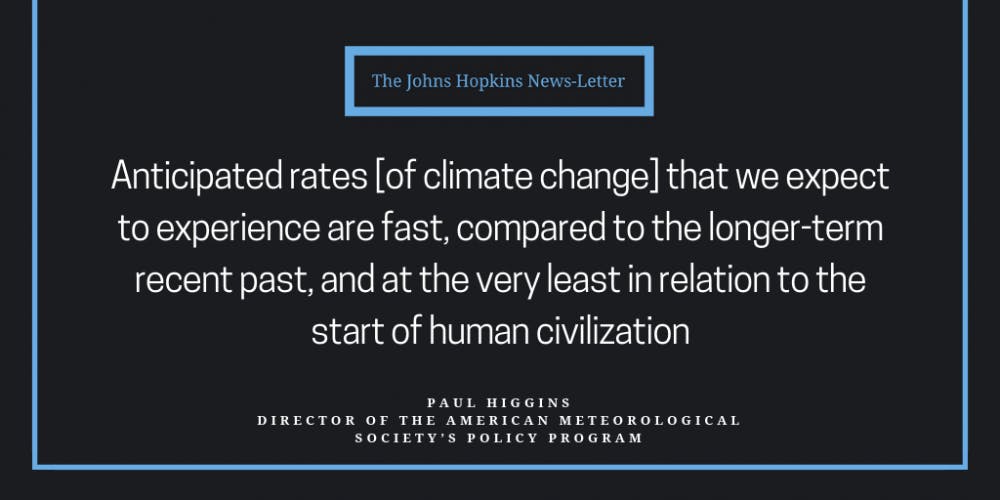Paul Higgins, the director of the American Meteorological Society’s (AMS) Policy Program, gave a talk on Feb. 7 titled “Climate Change As a Public Issue: The Role of Science in Policy” as a part of the Randolph Bromery Spring 2019 Seminar Series.
Higgins introduced a framework for thinking about climate change that he created with Jonah Steinbuck, a colleague. The purpose of the framework is to create a unified approach to thinking critically about climate change. According to Higgins, assessments of the risks of climate change tend to reflect the background of the experts who formulate those assessments.
Economists, who are more likely to characterize climate change as a low-risk issue, are experts in a discipline which focuses on substitution. Their reasoning may be that if climate change leads to a loss of resources, then humans can discover or create substitute materials. Biologists, who are convinced of the severity of the risks of climate change, study highly sensitive and complex interactions. In their studies, small changes can have a cascading impact on the ecosystem. Physical scientists, according to Higgins, display a bit of both.
The framework is three-pronged. It encourages experts to think of the extent and rate of climate change, the sensitivity of physical characteristics, social institutions and biological resources to changes in climate, and the capacity humans have to find substitutes for loss of resources.
Higgins asserts that climate change is occurring rapidly compared to historical trends.
“Anticipated rates [of climate change] that we expect to experience are fast, compared to the longer-term recent past, and at the very least in relation to the start of human civilization,” Higgins said.
Higgins speculated that climate change may not have been as grave an issue if humans had not adapted to the current climate. But considering that humans have built cities and infrastructure tailored to certain climates, the sea level rises and changes in weather patterns will affect those constructions.
He then considered a range of scenarios that climate change can lead to, as well the likelihood of those events. He offered a potential worst-case scenario — the extinction of human civilization due to climate change. Higgins argued that the probability of that occurrence is unknown, but it is likely low.
Alternatively Higgins said that the best-case scenario would be that the emission of greenhouse gases preserves the human race. If there was a massive cooling event, the cooling of the sun or the collision of an asteroid for example, then greenhouse emissions could prevent extreme cooling.
But Higgins cautioned that such a scenario is a low-probability event. The stipulation that the cooling event must be benign enough to be warded off by greenhouse gas emissions give it an additional low probability characteristic.
Overall, when considering the likelihood of certain events, Higgins concluded that negative outcomes outweigh the positives.
“There are a lot of reasons to think that downside risk is greater than upside potential,” Higgins said.
Higgins discussed the politics which pervade debates of climate change. Scientists regard climate change as a substantive issue and therefore find it difficult to understand its politicization.
The politicization arose from what Higgins termed “historical accidents.” The Clean Air Act of 1990 prescribed market-based solutions to reduce emissions. The market-based approach was originally espoused by Republicans, but then Democrats began to fully embrace market control. That and other “historical accidents,” according to Higgins, further strengthened the association between party affiliation and views on climate change.
Higgins said that his experiences working with a senator from Ohio helped him understand political constraints surrounding climate change.
“If you are a senator and your key issue is child welfare and you have to take a vote [on climate change] that isn’t going to result in anything meaningful other then the possibility that you may not be there the next time child issues come up, what are you going to do?”
Lucy Webb, a junior majoring in Earth & Planetary Sciences, wished Higgins elaborated on his time in the senator’s office.
“Diving deeper into the political issues from his experience working with the senator, and understanding the restrictions placed on politicians — and how that impacts climate decisions — would have been more beneficial to scientists to understand the other side of the table and create more effective policies,” Webb said.
Higgins offered ways to mitigate the effects of climate change. He spoke of holding politicians accountable when they express doubts that climate change exists, instituting a carbon tax and funding geoengineering projects to deliberately counteract the impact of climate change on a global scale.
Senior Michaela Sten appreciated the solutions that Higgins enumerated.
“His point about policies were helpful. But it would have also been helpful if he spoke from a more grounded stance about policy and cited evidence and examples instead of a broad stroke approach,” Sten said.





